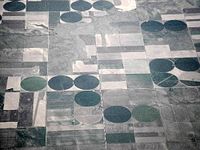
Photo from wikipedia
ABSTRACT The analysis of energy efficiency of agroecosystems from a sociometabolic perspective is a useful way to assess the sustainability of farm systems. In this paper we examine the transition… Click to show full abstract
ABSTRACT The analysis of energy efficiency of agroecosystems from a sociometabolic perspective is a useful way to assess the sustainability of farm systems. In this paper we examine the transition of a Mediterranean agroecosystem from an organic farm system in the mid nineteenth century to an industrialized one at the end of the twentieth century by means of the technologies and ideology of the Green Revolution. Given that many of the world’s agricultural systems have experienced, or are currently experiencing this transformation, our results are relevant for building more sustainable agricultural systems in future. Our results highlight the relevance of livestock density, and the flows of biomass reused and unharvested biomass as key elements affecting the sustainability of the agroecosystem not only from a socioeconomic perspective, but also from an agroecological point of view. Additionally, from a biocultural perspective our investigation sustains the relevance of the study of traditional farm systems for the development of a sustainable agriculture.
Journal Title: International Journal of Agricultural Sustainability
Year Published: 2018
Link to full text (if available)
Share on Social Media: Sign Up to like & get
recommendations!